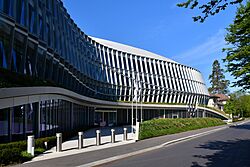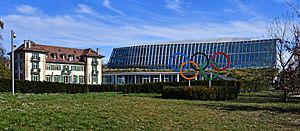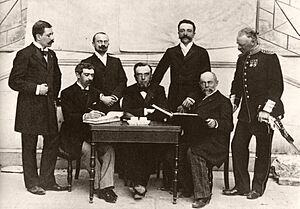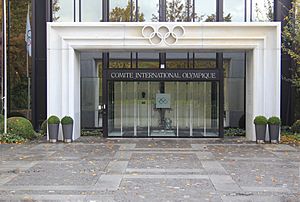International Olympic Committee facts for kids
|
Comité international olympique (French)
|
|
 |
|

IOC headquarters in Lausanne, Switzerland
|
|
| Abbreviation | IOC (English), CIO (French) |
|---|---|
| Formation | 23 June 1894 |
| Founders | Pierre de Coubertin Demetrios Vikelas |
| Type | Sports federation (association organised under the laws of the Swiss Confederation) |
| Headquarters | Olympic House, Lausanne, Switzerland |
|
Membership
|
110 active members, 39 honorary members, 206 individual National Olympic Committees |
|
Official language
|
French (reference language), English, and the host country's language when necessary |
|
Honorary President
|
Thomas Bach |
| Kirsty Coventry | |
|
Vice Presidents
|
Juan Antonio Samaranch Salisachs Nawal El Moutawakel Gerardo Werthein Pierre-Olivier Beckers-Vieujant |
|
Director General
|
Christophe De Kepper |
| Anthem: Olympic Anthem Motto: Citius, Altius, Fortius – Communiter (Latin: Faster, Higher, Stronger – Together) |
|
The International Olympic Committee (IOC) is a worldwide sports group. It is in charge of the modern Olympic Games. Two people, Pierre de Coubertin and Demetrios Vikelas, started the IOC in 1894. Its main office is in Lausanne, Switzerland.
The IOC organizes the Summer, Winter, and Youth Olympics. It also leads the Olympic Movement. This movement includes all the groups and people involved in the Olympic Games. As of 2020, the IOC recognized 206 National Olympic Committees (NOCs). Since February 2025, Kirsty Coventry has been the IOC president. She is the first woman and first African to hold this role.
What the IOC Does
The main goal of the IOC is to spread the ideas of Olympism around the world. It also leads the Olympic Movement. Here are some of its key missions:
- To encourage good behavior and fair rules in sports.
- To help young people learn through sports.
- To make sure fair play is important and violence is avoided.
- To help organize and develop sports events.
- To make sure the Olympic Games happen regularly.
- To work with other groups to use sports for the good of humanity and peace.
- To make the Olympic Movement strong and independent.
- To support athletes and their representatives.
- To help women in sports achieve equality.
- To protect clean athletes by fighting against doping and cheating.
- To support medical care and health for athletes.
- To stop anyone from using sports or athletes for political or business reasons.
- To help athletes plan for their future after sports.
- To encourage sports for everyone, not just professionals.
- To care about the environment and make the Olympic Games sustainable.
- To make sure the Olympic Games leave a positive impact on host cities.
- To combine sports with culture and education.
- To promote safe sports and protect athletes from harm.
The IOC defines sport as a competitive physical activity or game. It aims to improve fitness and skills. It also brings excitement, teamwork, and fun to both players and viewers.
IOC Member Promise
Every person who becomes an IOC member must make a special promise. They promise to serve the Olympic Movement with their best effort. They agree to follow the Olympic Charter and the IOC's decisions. They also promise to act fairly, without being influenced by money, politics, race, or religion. They commit to fighting discrimination and always promoting the interests of the IOC and the Olympic Movement.
History of the IOC

Pierre de Coubertin created the IOC on June 23, 1894. Demetrios Vikelas was its first president. The IOC is one of the oldest and most powerful international non-governmental organizations. As of February 2022, it had 105 active members and 45 honorary members. The IOC is the top authority for the modern Olympic Movement worldwide.
The IOC organizes the modern Olympic Games and Youth Olympic Games (YOG). These events happen every four years in summer and winter. The first Summer Olympics took place in Athens, Greece, in 1896. The first Winter Olympics was in Chamonix, France, in 1924. The first Summer YOG was in Singapore in 2010. The first Winter YOG was in Innsbruck, Austria, in 2012.
Until 1992, both the Summer and Winter Olympics were held in the same year. After that, the IOC changed the Winter Olympics to happen in the even years between Summer Games. This helped with planning and improved the IOC's finances. The IOC earns more money in Olympic years.
Since 1995, the IOC has worked to address environmental concerns. In 1995, IOC President Juan Antonio Samaranch said the environment would be a key part of organizing the Games. In 1996, the IOC added "environment" as a third main goal for the Olympic Games, alongside sport and culture.
In 2000, the "Green Olympics" effort started for the 2008 Summer Olympics in Beijing. Beijing carried out over 160 projects to improve air quality and water quality. They also focused on sustainable energy, waste management, and environmental education. These projects included moving or closing factories and improving traffic control.
In 2009, the UN General Assembly gave the IOC "Permanent Observer" status. This means the IOC can be directly involved in UN discussions and attend UN General Assembly meetings. In 1993, the UN also supported the idea of an Olympic Truce, which is a call for peace during the Games.
In November 2015, the IOC got approval to build a new headquarters in Vidy, Lausanne. This building, called "Olympic House," opened on June 23, 2019. This date was also the IOC's 125th anniversary. The Olympic Museum is still in Ouchy, Lausanne.
In September 2024, the IOC announced candidates for the presidency. These included Sebastian Coe, David Lappartient, Kirsty Coventry, and Juan Antonio Samaranch Salisachs. Other candidates were Prince Faisal bin Hussein, Johan Eliasch, and Morinari Watanabe.
In February 2025, the IOC announced the first Olympic Esports Games. They will take place in 2027 in Riyadh, Saudi Arabia. The IOC will work with the Esports World Cup Foundation to create this event.
In March 2025, Kirsty Coventry was elected as the IOC President. She wants to make the Olympics open to everyone, no matter where they are from. She also aims to use sports to bring people together globally. The IOC is also working more closely with BRICS nations to promote unity through sports.
How the IOC is Organized
The IOC is a type of association under Swiss law.
IOC Session: The Main Meeting
The IOC Session is the yearly meeting of all IOC members. Each member gets one vote. This is the IOC's most important meeting, and its decisions are final. Special Sessions can be called by the President or if many members ask for one.
Some of the Session's powers include:
- Changing the Olympic Charter (the rules of the Olympic Movement).
- Electing new IOC members, the Honorary President, and honorary members.
- Electing the President, Vice Presidents, and other members of the IOC Executive Board.
- Choosing the host city for the Olympic Games.
IOC Executive Board
The Executive Board was started in 1921. It manages the daily work of the IOC. It includes the President, four Vice Presidents, and ten other members. All members are elected for a four-year term. Meetings happen when the president calls them or when most members ask for one.
The Board's jobs include:
- Managing the IOC's overall operations.
- Making sure the Olympic Charter is followed.
- Approving the IOC's internal rules.
- Managing the IOC's money and preparing reports.
- Suggesting changes to the Olympic Charter.
- Suggesting people to be elected as IOC members.
- Managing the process for choosing Olympic Games host cities.
- Setting the agenda for IOC Sessions.
- Appointing the Director General.
- Creating rules to make sure the Olympic Charter and Games are run properly.
- Meeting regularly with sports federations and National Olympic Committees.
- Giving out IOC awards.
- Doing other tasks given by the Session.
| Designation | Name | Country |
|---|---|---|
| Honorary President | Thomas Bach | |
| President | Kirsty Coventry | |
| Vice Presidents | Juan Antonio Samaranch | |
| Nawal El Moutawakel | ||
| Gerardo Werthein | ||
| Pierre-Olivier Beckers-Vieujant | ||
| Executive Members | Nenad Lalović | |
| Ivo Ferriani | ||
| Prince Feisal Al Hussein | ||
| Mikaela Cojuangco Jaworski | ||
| Kristin Kloster Aasen | ||
| Emma Terho | ||
| Li Lingwei | ||
| Spyros Capralos | ||
| Octavian Morariu | ||
| Director General | Christophe De Kepper |
IOC Members

The IOC can have up to 115 members. When people become IOC members, they represent the IOC in their own countries. They are not representatives of their countries to the IOC.
IOC members can be:
- Athletes who represent other athletes.
- Representatives from international sports groups.
- Representatives from National Olympic Committees.
- Individual members who are not linked to specific roles in other groups.
When Membership Ends
Membership in the IOC can end for several reasons:
- Resignation: A member can choose to leave by writing to the President.
- Not Re-elected: If a member is not chosen again, their membership ends.
- Age Limit: Members stop being members at the end of the year they turn 70 or 80. This depends on when they joined the IOC.
- Not Active: If a member does not attend meetings or take part in IOC work for two years in a row.
- Moving: If a member moves their main home or interests to a different country.
- Athlete Representatives: Members elected as athletes stop being members when they leave the IOC Athletes' Commission.
- Leaders of Other Groups: Members who were elected because they led other sports groups stop being members when they leave that leadership role.
- Expulsion: A member can be removed if they break their promise, harm the IOC's interests, or act in a way that is not fitting for the IOC.
IOC Awards and Honours
The IOC gives out gold, silver, and bronze medals to the top three athletes in each Olympic event.
Other special awards include:
- Pierre de Coubertin Medal: For athletes who show great sportsmanship.
- Olympic Cup: For groups or associations that have done great work for the Olympic Movement.
- Olympic Order: For individuals who have made outstanding contributions to the Olympic Movement.
- Olympic Laurel: For people who promote education, culture, development, and peace through sport.
- Olympic town status: For towns that have been very important to the Olympic Movement.
How the IOC Earns Money
For a long time, the IOC had a small budget. An early IOC president, Avery Brundage, did not want the Olympics to be involved with businesses. He thought businesses would unfairly influence the IOC. Because of this, Olympic organizing committees had to find their own sponsors.
After Brundage retired, the IOC's money grew a lot. This was because they started to work with businesses and sell TV rights. When Juan Antonio Samaranch became IOC president in 1980, he wanted the IOC to be financially independent. He asked Richard Pound to lead this effort.
The IOC worked with marketing companies to create a global marketing program. This program helped bring in billions of dollars from sponsorships and TV deals. This greatly improved the IOC's financial health.
IOC Revenue
The Olympic Movement earns money in five main ways:
- TV Deals: Money from TV companies that broadcast the Games. The IOC manages this.
- Global Sponsors: Money from big companies that sponsor the Olympics worldwide. This is part of the IOC's TOP program.
- Local Sponsors: Money from companies that sponsor the Games only in the host country. The local organizing committees manage this.
- Tickets: Money from selling tickets to events.
- Licensing: Money from selling products with Olympic symbols in host countries.
The local organizing committees handle local sponsorships, tickets, and licensing. The Olympic Movement earned over US$4 billion from 2001 to 2004.
- How Money is Shared
The IOC shares its money with different groups in the Olympic Movement. This helps pay for the Games and develop sports worldwide. The IOC keeps about 10% for its own costs. From 2013 to 2016, the IOC earned about US$5.0 billion. Most of this came from TV rights (73%) and Olympic Partners (18%). The organizing committees for the Rio 2016 Games received US$1.5 billion. The Sochi 2014 committee received US$833 million. National Olympic Committees and international sports groups each received US$739 million.
Organizing Committees for the Olympic Games
The IOC gives money from its TOP program and TV deals to the committees that organize the Olympic Games.
- TOP Program Money: The two organizing committees for each four-year Olympic period usually share about 50% of the TOP program money. The Summer Games committee gets about 30%, and the Winter Games committee gets about 20%.
- TV Money: The IOC gives 49% of the Olympic TV money for each Games to the organizing committee. For example, the Salt Lake 2002 committee received US$443 million, and the Athens 2004 committee received US$732 million.
- Local Money: Organizing committees also earn a lot of money from local sponsorships, tickets, and licensing in their host country.
National Olympic Committees
National Olympic Committees (NOCs) get money to train and develop their Olympic teams and athletes. The IOC shares TOP program money with each NOC. The IOC also gives TV money to Olympic Solidarity. This is an IOC group that helps NOCs that need the most support. The IOC gave about US$318.5 million to NOCs from 2001 to 2004.
International Sports Federations
The IOC is the biggest source of money for most international sports federations (IOSFs). This money helps them develop their sports. The IOC supports the 28 IOSFs for Summer Olympic sports and the seven IOSFs for Winter Olympic sports. As TV deals grow, the IOC can give more money to these federations. For example, the seven Winter sports federations shared US$85.8 million from the Salt Lake 2002 TV money.
Other Organizations
The IOC also gives money from its marketing to other recognized international sports groups. These include the International Paralympic Committee (IPC) and the World Anti-Doping Agency (WADA).
Environmental Care at the Olympics
The IOC requires cities that want to host the Olympics to have a detailed plan for protecting the environment. This plan covers before, during, and after the Games.
IOC's Environmental Approach
The IOC has four main ways to deal with environmental concerns:
- The IOC Sustainability and Legacy Commission focuses on improving environmental strategies for the Games.
- Every city applying to host must provide information on environmental issues like air quality.
- Host cities can make promises to address specific environmental concerns.
- Host cities must work with the United Nations to meet environmental goals.
Building Venues and the Environment
Effects on Air Quality
Host cities worry about traffic and air pollution. These can harm air quality during and after building Olympic venues. Steps are taken to improve air quality. For example, traffic is controlled, and heavy vehicles might be banned.
Beijing Olympics Air Quality
For the Beijing Olympic Games, a main concern was tiny particles in the air, called PM10. These particles and other pollutants can cause health problems like asthma. They also harm city environments. To improve air quality, Beijing banned older vehicles and used an odd-even rule for cars. They also switched from coal to natural gas, stopped construction, and closed polluting factories. These actions helped reduce pollution, and air quality was good on most days during the Games. Beijing also used silver iodide to make it rain, which helped clear pollutants from the air.
Effects on Soil
Building can also contaminate soil. For the Sydney Olympic Games in 2000, a very polluted area called Homebush Bay was cleaned up. Contaminated soil was moved to special areas, making the rest of the site safe for recreation. In the 2006 Games in Torino, Italy, researchers found an increase in metals in the soil after the Games.
For the London 2012 Olympic Games, residents were promised a "blueprint for sustainable living." However, some gardens were temporarily moved for the Olympic stadium. When they were returned, the soil quality was damaged. Also, residents and workers were exposed to radioactive waste during the site excavation.
Effects on Water Quality
The Olympic Games can affect water quality. Rain can wash pollutants from the air into water sources. These pollutants come from natural things like plant matter and man-made things like vehicle exhaust. These can increase toxins in street dust, which then washes into water.
In 2013, researchers in Beijing found that rain helped clear tiny air particles (PM2.5) by washing them into water sources. This greatly improved air quality at the venues.
IOC Commissions
These groups have specific jobs within the Olympic Movement. The IOC President, Executive Board, or Olympic Charter can create them. The President is a member of all commissions. They choose the members and decide when a commission's work is done.
| Commission | Chairperson | Country | Mission/Responsibilities |
|---|---|---|---|
| IOC Athletes' Commission | Emma Terho | Represents athletes and helps them succeed in their sports and careers. | |
| IOC Audit Committee | Pierre-Olivier Beckers-Vieujant | Helps manage risks, finances, and rules for the IOC. | |
| IOC Esports Commission | David Lappartient | Oversees the IOC's Esports activities and plans for future Olympic Esports Games. | |
| IOC Future Host Commission For The Olympic Winter Games | Karl Stoss | Explores and oversees interest in future Winter Olympic Games. | |
| IOC Future Host Summer Commission For The Games Of The Olympiad | Kolinda Grabar-Kitarovic | Explores and oversees interest in future Summer Olympic Games. | |
| IOC Coordination Commission Brisbane 2032 | Mikaela Cojuangco Jaworski | Supervises the planning for the Brisbane 2032 Summer Olympics. | |
| IOC Coordination Commission French Alps 2030 | Pierre-Olivier Beckers-Vieujant | Supervises the planning for the French Alps 2030 Winter Olympics. | |
| IOC Coordination Commission Los Angeles 2028 | Nicole Hoevertsz | Supervises the planning for the Los Angeles 2028 Summer Olympics. | |
| IOC Coordination Commission Dakar 2026 (YOG) | Humphrey Kayange | Supervises the planning for the Dakar 2026 Youth Olympic Games. | |
| IOC Coordination Commission Milano Cortina 2026 | Kristin Kloster Aasen | Supervises the planning for the Milano Cortina 2026 Winter Olympics. | |
| IOC Culture and Olympic Heritage Commission | Khunying Patama Leeswadtrakul | Oversees cultural activities to promote Olympic ideals, especially to young people. | |
| IOC Digital and Technology Commission | Gerardo Werthein | Oversees marketing and digital programs. | |
| IOC Ethics Commission | Protects the ethical rules of the Olympic Movement and suggests actions for rule-breaking. | ||
| IOC Finance Commission | Ng Ser Miang | Gives advice on the IOC's money management to ensure transparency. | |
| IOC Legal Affairs Commission | Denis Oswald | Oversees the legal matters of the IOC. | |
| IOC Medical and Scientific Commission | Robin E. Mitchell | Guides other sports groups on protecting athletes' health. | |
| IOC Olympic Channel Board Of Directors | Richard Carrión | Manages the Olympic Channel, which shows Olympic sports year-round. | |
| IOC Olympic Education Commission | Mikaela Cojuangco Jaworski | Oversees the promotion of Olympic values through education, especially for youth. | |
| IOC Olympic Programme Commission | Karl Stoss | Analyzes and suggests changes to the Olympic Games programs. | |
| IOC Olympic Solidarity Commission | Robin E. Mitchell | Provides help to National Olympic Committees, especially those most in need. | |
| IOC Sustainability and Legacy Commission | Albert II, Prince of Monaco | Oversees sustainability and legacy to maximize positive impacts from the Games. | |
| Gender Equality, Diversity and Inclusion Commission | Lydia Nsekera | Oversees strategies to advance gender equality and inclusion in sport. |
The Olympic Partner (TOP) Program
The TOP program includes major companies that sponsor the Olympic Games worldwide. These sponsors help provide important funding for the Games.
Some of the current global sponsors are:
- AB InBev
- Airbnb
- Allianz
- Alibaba Group
- Coca-Cola-Mengniu Dairy (a joint partnership)
- Deloitte
- Omega SA
- Procter & Gamble
- Samsung Electronics
- TCL Technology
- Visa Inc.
See also
 In Spanish: Comité Olímpico Internacional para niños
In Spanish: Comité Olímpico Internacional para niños
- International Paralympic Committee (IPC)
- World Anti-Doping Agency (WADA)
- List of IOC meetings
- Olympic Congress
 | Kyle Baker |
 | Joseph Yoakum |
 | Laura Wheeler Waring |
 | Henry Ossawa Tanner |


